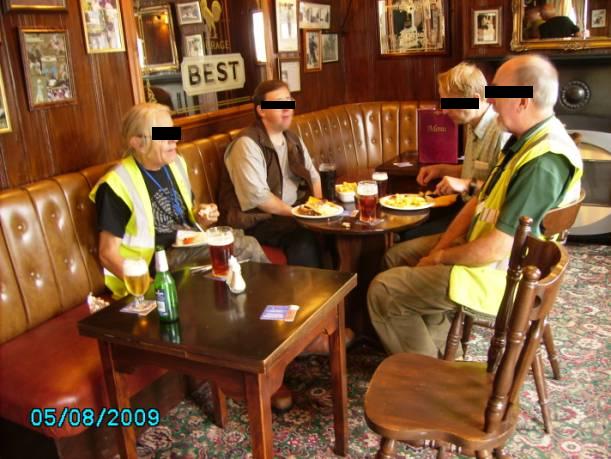Let’s begin with the parable of Pablo Picasso’s dinner…
Picasso, or so the story goes, was sitting in a Paris café when an admirer approached from a neighbouring table and asked for a quick sketch on the back of a napkin. Picasso politely agreed, swiftly executed the work, and handed it back — but not before asking for an eye-watering amount of money.
The admirer was understandably shocked: “How can you ask for so much? It barely took you a minute to draw!”
“On the contrary,” Picasso replied, “It took me over 40 years”
 So what’s a crap drawing of a horse without any legs got to do with anything? There’s a spat currently running on BAJR – the diggers website forum – following rumours that a county council archaeology department is insisting that only professionally accredited archaeology companies (members of the Institute for Archaeologists Registered Organisation Scheme) are allowed to undertake development-led archaeology in their territory.
So what’s a crap drawing of a horse without any legs got to do with anything? There’s a spat currently running on BAJR – the diggers website forum – following rumours that a county council archaeology department is insisting that only professionally accredited archaeology companies (members of the Institute for Archaeologists Registered Organisation Scheme) are allowed to undertake development-led archaeology in their territory.
Outsiders to our discipline might be surprised to find that rather than welcome these moves, the overwhelming consensus on the forum is that such a restriction is a bad thing. Head honcho at BAJR, David Connolly – the Che Guevara of British Archaeology – recently took this line in an impassioned piece for Antiquity. Advocating (and practicing) a bottom-up archaeology ‘for the people by the people,’ the root problem according to Connolly can only be tackled through inclusivity. Regulation is the enemy because “if the public loses interest in its past due to marginalisation, who will be left to speak up for archaeology when bulldozers and concrete literally obliterate our past?”

Diametrically opposed in politics, but in complete agreement over the ‘problem’ of regulation, comes right-wing firebrand Andrew Selkirk, Editor-in Chief of Current Archaeology and champion of the independent amateur archaeologist. Selkirk wrote a short pamphlet in 1997 called ‘Who Owns The Past: A Grass Roots Critique of Heritage Policy’ (Adam Smith Institute). Rallying against an ‘artificial’ heritage market created through planning policy guidance that only serves to distance archaeology from it’s natural support base (the independent amateur tradition), he argues for a free market where amateurs undertake rescue archaeology as part of a ‘leisure economy.’
Though they would be loath to admit it, from the left and from the right there exists a coalition of opposition against a perceived professional elite who threaten to take ownership of a past that belongs to everyone. That elite may or may not exist – but lets follow the logic here, and see where it leads a discipline dependent on developer funding.
Selkirk expands on what this brave new world may look like in the following passage:

“Professional archaeology often involves an element of prostitution: a professional archaeologist is rarely able to do his own thing. All too often, professional archaeologists end up either working for developers, or as planners, shuffling planning applications in planning offices and rarely seeing any real archaeology from one year to the next. However if an amateur archaeologist becomes a chartered accountant, the position could be reversed. It should not be beyond the bounds of possibility to set up in some attractive small town, and so arrange your life that you only work 4 days a week or 8 months in the year and spend more time doing archaeology than any professional archaeologist. And what is more, you will be able to choose archaeology – and you will earn more from accountancy than you ever would from archaeology.” (P22)
An imaginary world of mildly offensive elves and unicorns, right?
Wrong.

With Historic Environment protection being hollowed out in favour of a localism agenda, withdrawal of grant-in-aid and cuts to frontline local authority posts, there is no certainty that current funding models will continue in their present form. At the recent Mortimer debate, Councillor Alan Melton of Bunny Hugger infamy, provided three concrete examples of how growing the economy is incompatible with expensive archaeological work: the Neal Wade Community College (six figure project cost); a small private development in Wimblington entailing £9,000 of excavation, plus a further £12,000 for Post-Excavation; Chatteris Parish council who were charged £1,200 for archaeologists to monitor the installation of some new swings.
Andrew Selkirk’s solution continued in his previous vein, and was published in Current Archaeology in November:
“The second of those two cases both involve small-scale development that could have been undertaken by local amateur archaeologists, providing that the developers were willing to have the work undertaken at weekends, and to a possibly irregular time-table… Could not perhaps some stipulation be introduced that in the case of small developments, developers should be advised that they have the option of calling on local amateurs to do the work for free?”
And it’s already happening. A recent review of council planning submissions turned up this gem of a watching brief report – a development led project that would under normal circumstances be undertaken by a professional, completed for a 10th of the cost by a local amateur group. To the archaeological refuseniks that don’t believe in barring the market to all but Registered Organisations or suitably qualified and experienced individuals, read this report carefully [HERE], and weigh up your future.

Call it a product of recession, call it a lack of direction; call it anything you like, just so long as you call it: diluting archaeology’s professional status devalues our skills, experience and contribution to knowledge.
It’s as simple as that.
Follow the debate on BAJRFed HERE…


Well I consider myself as a pro.. just cant earn the money doing it full time…
But as part of a self funded research group we would certanly take on any task and well able too… But there would always be a costs involved, not least should anything turn up that needed conservation or detailed analisis….
Che BAJR here:
“To the archaeological refuseniks that don’t believe in barring the market to all but Registered Organisations or suitably qualified and experienced individuals, read this report carefully [HERE], and weigh up your future.”
You seem to have answered it yourself.. and this is actually my position.
Registered Organisations OR suitably qualified and experienced individuals
Yup… the word OR the barring of these suitably qualified and experienced individuals and having ONLY ROs that’s my beef. Restrict my practice? — over my suitably well paid professional experienced body
ps if you want my opinion on the watching brief in a back garden and ask was it worth it? You tell me. What extra would you get from a professional in a case like this? perhaps a nice report cover with a series of logos on the front 😉 well worth the 10x more
Dear Che (nice Beret!)
Thanks for clarifying your position. I was assuming RO/suitably qualified persons are basically the same thing – and I would define a MIfA as a suitably qualified person – which I’m guessing would still count as unfair and restrictive practice in your book?
I’m going to done my wig and judicial robes now, and roll out the 1992 Valletta Convention, Article 3, Clause ii:
“To preserve the archaeological heritage and guarantee the scientific significance of archaeological research work, each Party undertakes: to ensure that excavations and other potentially destructive techniques are carried out only by qualified, specially authorised persons.”
This seems like a perfectly reasonable proposition, yet one that sends the UK archaeology profession into paroxysms of existential crisis (but if we close the door, no one will like us any more, and if no one likes us, we will cease to exist).
Like it or lump it, we’ve opted (by accident or design) for a system of self regulation through a subscription based professional body. If the State is not prepared to define specially authorised persons it is only right that they should (and further to that, only right that the State should respect that judgement and restrict practice accordingly).
As for the watching brief report – I feel ambivalent about it. In truth, apart from a significantly better looking report, I can’t see how a professional would have added much to anything apart from the bill (assuming the amateur group didn’t miss anything in the trench). But then look at Picasso’s doodle. You’re pretty handy with a biro – bet you could do as good a job as that, and it would be a damn site cheaper too!
The fear I have is that these smaller projects are the bread and butter of our industry. With threats coming from so many other directions right now, this is surely the time to be manning the barricades, no?
I am Picasso……….. no i am Picasso………..i am Picasso……..it’s me, i am Picasso…….. ad infinitum
Ernesto might well continue to drive his cart along the crucifixed road but will he sleep well in our blooded puddles ?
“these smaller projects are the bread and butter of our industry.”
Are they really… are watching briefs on garden patios really what makes British Archaeology Tick? cough cough… hmmm At the end of the day it comes down to the curator deciding the work is up to standard.
I am pretty handy with Biros and other tech. but you get what you pay for. 🙂 (unless the company has massive overheads and all you get is a massive bill and a pretty cover, with nothing in it 🙂 )
Now… lets return to this rather odd concept that we have got knicker twisted on. I contend that RO status is a benefit, even MIfA is a bonus, but then so is being the person who knows the area well and has worked in the county for 2 years and never turned out a duff report. That too is a suitably qualified person. Indeed in returning to the WB – the question is… were they suitably qualified. If by suitably qualified you mean, the person MUST be in the IfA then currently I can’t do anything else but disagree.
Also the mix-up you have gotten from my Antiquity article is that I see the public involvement as an added benefit, not a threat. This year I have been lucky enough to have over 600 volunteers involved in projects… no archaeologists were harmed during the process – indeed money was generated for them, exhibitions undertaken, engagement and school projects created and everyone (including the archaeologists ) had fun.
Man the barricades… nah… I am off to talk to join the crowd as a freeman 🙂
Interesting issue here and I can see both sides of the arguement. At the end of the day there is a requirement that the work gets done to decent standard. This is something that needs to be monitored by the County Archaeologist (or equivalent) – in an ideal world, this would mean that there would be site visits from the County Mounty and rapid and effective feedback on documentation produced before and after the fieldwork. However, in a time of cutbacks it is increasingly difficult to rely on this level of overview. It may be that in asking the contractor to be a Registered Organisation is an attempt to ensure that there is some kind of quality threshold in lieu of close monitoring by the curator (the whole question of whether RO status is a guarantee of quality is a quite different matter…).
I can fully see situations where ‘amateur/independent’ groups could do such basic fieldwork for free. Some such groups are capable of producing professional standard work and reports- others, however, are not, no matter how well intentioned. There will always be the need for some level of monitoring, including ensuring relevant H&S / insurance issues are covered.
I also think if I was a developer I might also feel some level of unease in entering into this kind of relationship with an amateur/independent group- one would need some kind of secure contract to ensure that the work conformed to the WSI, all relevant insurance/indemnity issues were in place, there was a secure delivery timetable etc. I’m not sure how many local groups would be prepared or able to make that commitment.
Comrade BAJR biscuit – surely you can agree that all excavations should be run by a qualified archaeologist? Is it then not a given that the qualification therefore needs to be of a quantifiable standard, be regulated, and in the interests of the resource and the nations heritage be registered?
I fank you comrade.
I would say the archaeology has to be carried out by a competent archaeologist. define qualified?
I have no degree, but I do have a string of projects stretching back nearly 25 years and a wealth of experience. So am I qualified? Am I competent? are they the same?
I would say that if we want to get into a discussion about competent or even worse… actually putting the archaeology first. then we get into proper murky water. Do you carry out minimum requirements to fulfil the brief? OR do the best you can? I bid for doing the best – take it or leave it. I could do minimum, but then I don’t feel that is meeting my own standards. I could for example just look at the building I am working on just now, but that ignores the castle that lies outwith the development area, and I am paying a professional historian for background, not because I have to, but because it makes for a full report.
I agree that the group better have the requisite H&S policy, have insurance and a slew of other requirements… if not.. then the question must be asked… who let that pass?
think on?
Mobody is doubting your competence David but the mounties are ill-equiped and under-staffed whilst the local yokels are enthusistic but rarely as capable as a seasoned professional. In Diggins example we are led to believe the foundation trenches were devoid of archaeological content but the photo shows the ‘after’ not the ‘during’, which is where the archaeology would have been. Watching foundation trenches is a skill, not a walk in the park.
Crumbs Bajr-Biscuit!
As well as competence, no one here doubts your commitment to the cause either (we too launched a successful outreach event in the summer involving over 10,000 consenting adults; it was really hard, but very rewarding – especially for the archaeologists!).
But… dare I say it… your history as an extremely successful outsider to the archaeological establishment (in mirror image to that other extremely successful outsider mentioned above) is clouding your judgement on this one issue. To extend the doodle analogy, your version of collaboration between professionals and amateurs is like Picasso running extramural art classes in his spare time to ensure his future napkin doodles will be better appreciated in future. All well and good, but we now find ourselves in a world making tough financial choices – with an electorate asked what’s more important: your house burning down or your archaeology being looked after:
http://www.cambridge-news.co.uk/Newmarket/Residents-opt-for-bus-cuts-in-hunt-18112011.htm
This isn’t a question of ethic – of larger purpose above and beyond the daily grind of churning yet out another watching brief for yet another planning condition. It isn’t a question of making room for the little man – with hard-won knowledge wrestled from outside the archaeological establishment.
It’s about regulating a market in order to maintain a professional ecology in the face of threats from every quarter. These are bread and butter jobs – small enterprises with 10-20 field staff plus specialists (i.e. your typical RO + MIfA set up) would hope to turn over five of these a week, mopping up the gravy from larger projects (sadly now few and far between).
Aside from Lad on a Lunch Break’s point about competence on the ground (bit early for Dinner isn’t it?) protecting our market from all commers is another line of defence. That’s all.
It’s not personal. It’s business.
Been inspiring the community at large to apprciate the beauty of professionalism – so eating early diggin
Nothing taken personally, I am just trying to make a point that
By suggesting there is only one way to maintain standards – ie the RO is wrong. Indeed it is odd. I was a MIFA… whooo hooo! Based on my ability to prove competence in running Projects then I left. Then I find myself a MIFA again.. because I was in teh AAI&S so based on my membership of an illustrators organisation Superb… now… I can’t tell if a MIFA can or can’t run projects. yipes, I better become an RO as well… after all, now that MIFA means so many things I better register my company as well!
Fair enough, we need regulation… we need to ensure standards. we need to make sure the lovely guidelines and standards are maintained. So who is best placed to do that? um… wait a second… the curators! hard pressed, but then, as I was a DC archaeologist myself, it is what we do/did – no really, Whether a company was an RO or not was not really that important to a report it just had to be good enough to meet the criteria. Perhaps you suggest that an ROs report should just be waved through the fast track channel, to save the poor DC Arch having to waste time checking what will of course be perfect work? After all ROs are checked for quality by the IfA who will ensure the quality off all the work. phew! Just as well with less council archaeologists.
Next will come the annoying little sole traders who mop up the watching briefs (yurk… thats me as well!) Perhaps we should just restrict archaeology to companies over 20 people, with offices?
I will try and say this succinctly.
Regulation is good, RO is one (1) way to show competence, there are other ways. Work is judged by meeting criteria of what was required – the person who judges is not the IfA it is the DC archaeologist – Public can get involved but within again strict criteria.
To follow your analogy… and twist its neck until it chokes. The Art night class turns out people who are trained by Picasso, but don’t have 40 years of being Picasso behind them. People I train may be as good as me, but only after they have kicked about for a couple more decades.
pps calling the public local yokels is perhaps the point of how archaeologists view them?
(we too launched a successful outreach event in the summer involving over 10,000 consenting adults; it was really hard, but very rewarding – especially for the archaeologists!).
“Great… so you see you can do both – professional archaeology and outreach… thats all I want to see. ”
Do I want to see local groups carrying out archaeology projects in development – not particularly, but if they have the competence, the relevant insurances, the backup, the ability to work on a project lasting 3 weeks solid ( tough for local groups ) etc… then… I should not stop them. I just feel you are manning a barricade on such a tiny threat, you miss the one behind you.
I will concede that a monkey could become MIfA and IfA need to seriously consider if the drive for total sector membership will be served whilst this remains the case – but crumbs, further fragmentation, who will that serve?
This letter, published this month in Current Archaeology:
‘Am I alone in being disturbed by the assumption – increasingly taken for granted – that voluntary groups will take over small-scale development-related archaeology, particularly concerning watching briefs (CA 260 ‘Last Word’ [as quoted from Selkirk above]).
Our local group has been approached four times this year by developers with small-scale projects – unpaid, of course. Each time we have said no, recommending local professional bodies. We do not have insurance for this, nor the administrative backup, and all our field time is taken up with research-based projects. The only times we undertake commercial work is when the site belongs to a charity like a church, and even then I insist that we are supervised by a paid professional.
I know and greatly respect CA’s support for the independent sector, but there seems to be something very odd going on here – voluntary groups being encouraged to displace professionals. To use an emotive phrase, we are being encouraged to take bread from the mouths of young archaeologists. Or have professional units become so professional that they do not undertake little jobs any more? In which case there is scope for young entrepreneurs. But to expect a highly commercial job to be done by unpaid volunteers is the Big Society gone mad, isn’t it?
Dr Pat Reid – Faversham Society Community Archaeologist’
Yes Pat, it is the Big Society gone mad. Thank you for such an informed understanding, and for acknowledging that such moves do indeed take the bread from the mouths of young archaeologists. We’re really into-bread. Especially in Kent.
Miss Faversham – i do
who you callin spammy